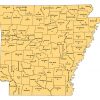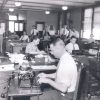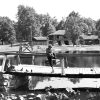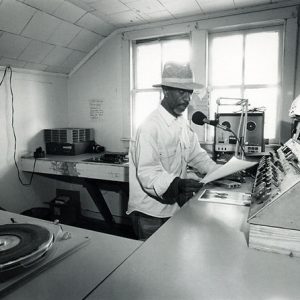calsfoundation@cals.org
KABF
The KABF radio station (FM 88.3) in Little Rock (Pulaski County) began broadcasting an eclectic mix of music, news, and community driven content in 1984. “The Voice of the People” has exposed Arkansans to genres rarely heard on commercial radio, given local artists radio airplay, and provided organizations and citizens with a means to reach a wide audience with their messages. The broadcast signal carries to most of Arkansas’s seventy-five counties, as well as some neighboring states, and reaches an estimated 50,000 listeners every week. KABF is one of only twelve non-commercial radio stations in the United States with the maximum allowed signal of 100,000 watts.
KABF was conceived as a project of Association of Community Organizations for Reform Now (ACORN) in the late 1970s. ACORN had fought for a rate freeze so that low-income families could better afford basic utilities, first winning a local ballot initiative before losing in court to utility companies represented by future Little Rock mayor Webb Hubbell and future U.S. secretary of state Hillary Rodham Clinton. ACORN founder Wade Rathke believed that in order for the organization to be more effective, it needed to reach a wider audience. Rathke worked directly with Lorenzo Milam, a nationally known community radio pioneer, first establishing KNON (another ACORN-affiliated station in Dallas, Texas) and then the Arkansas Broadcasting Foundation (ABF), which applied for a 100,000-watt license.
The license was somewhat hotly contested between ABF and the University of Arkansas at Little Rock (UA Little Rock), since it was the only remaining 100,000-watt public radio frequency in central Arkansas. Eventually, ABF worked out a deal with UA Little Rock and Hendrix College’s KHDX to transfer frequencies, allowing ABF to obtain the license. After several years raising funds for the station’s equipment and tower, KABF began broadcasting on Friday, August 31, 1984, barely meeting the deadline given to it by the FCC. This was an entirely volunteer effort, with major contributions from Joe Fox, owner of Little Rock’s Community Bakery; Tom Rusk, the station’s engineer for many years; Scott Holladay, KABF’s first station manager; and program manager John Cain. The station started out at 10,000 watts before boosting its signal to 100,000 in 1987.
KABF’s original home was at 1501 Arch Street in Little Rock, a small space where DJs sometimes had to contend with mice scurrying across the turntables. The station moved along with ACORN to 2101 Main Street in 1998. The broadcasting tower for KABF was one of the first built on Crystal Mountain, near Shinall Mountain, a local landmark known for its many radio, television, and cell towers.
KABF was closely tied to ACORN for the first few decades, often broadcasting public service announcements, news, membership drives, and community discussions related to ACORN’s campaigns. KABF was instrumental in ACORN’s efforts in the 1980s to pressure ArkLa (now Entergy) to institute a no-shut-off policy to help residents in need, and ACORN’s challenge to the merger involving Boatmen’s Bank in 1995, winning a deal to secure fair loan practices for low-income residents.
DJs at KABF established the station early on as a distinct alternative to commercial radio formats, playing a wide range of styles, including jazz, blues, folk, gospel, reggae, Afropop, and alternative rock. The station was the first in the state to broadcast hip-hop. In October 1984, Luis “Lucho” Reyes, who had left Chile to escape Augusto Pinochet’s regime, began hosting “Mundo Latino,” the first Spanish-language radio show in Arkansas. He was soon joined by Willie Cosme of Puerto Rico, who was the first to play salsa and merengue music on the radio in Arkansas. Both became involved in the station’s programming and management.
In the late 1980s and early 1990s, KABF was a central part of Little Rock’s burgeoning underground punk scene, with many DJs performing in bands themselves, playing local music, interviewing musicians from touring bands such as Black Flag on air, and hosting live shows to raise money for the station. KABF also broadcast local sports, having had broadcasting contracts with Arkansas State University, the University of Central Arkansas, and the Arkansas Riverblades (a now-defunct minor league hockey team) at various times.
KABF’s tower was nearly destroyed by a fire in 1999, cutting the station off the air. The station was able to come back three months later after a loan from sister station KNON and several community fundraising efforts. No one was ever arrested or charged with a crime, but many volunteers at the station believe the fire was due to arson and was set because of community activists discussing issues on the air that were considered controversial, such as LGBT rights and women’s rights.
The station faced another crisis in 2009, with ACORN facing allegations of voter fraud and embezzlement and KABF facing an investigation by the Corporation for Public Broadcasting (CPB) for mismanagement of funds. No criminal activity was uncovered, but CPB pulled funding from KABF and ACORN was dissolved. After significant changes in the structure of the station’s management, and several local fundraising efforts, KABF pulled its support together to stay on the air. The station is supported completely by community donors, underwriting partners, and volunteers.
For additional information:
Franco, Cheree. “Grass-Roots Radio.” Arkansas Democrat-Gazette, August 24, 2014, pp. 1E, 6E.
Green, William. “Listener-Supported KABF-FM Seen as a Potentially Powerful Aid for Poor.” Arkansas Gazette, September 26, 1984, pp. 1–2B.
KABF 88.3 FM. http://www.kabf.org/ (accessed July 22, 2020).
“KABF / Little Rock, AR.” Hibblen Radio. http://www.hibblenradio.com/KABF.html (accessed July 22, 2020).
“Low Tech, but High Energy: KABF Fuzzes the Format Lines.” Arkansas Times, February 1989, pp. 14, 16.
Sitton, Robert. “KABF: Little Rock’s Alternative Radio Station Celebrates 20 Years.” Little Rock Free Press, August 2004. Online at https://ronaldsitton.wordpress.com/2004/08/01/kabf-little-rocks-alternative-radio-station-celebrates-20-years/ (accessed July 22, 2020).
Smith, Doug. “I Don’t Think We’re Listening to Kansas Radio Anymore.” Arkansas Times, September 17, 1999, pp. 11–14.
Szenher, James. “The Shoog Radio Era.” Arkansas Times, October 16, 2014. Online at http://www.arktimes.com/arkansas/the-shoog-radio-era/Content?oid=3503788 (accessed April 12, 2017).
James Szenher
Little Rock, Arkansas
 Counties
Counties Divergent Prosperity and the Arc of Reform, 1968–2022
Divergent Prosperity and the Arc of Reform, 1968–2022 Mass Media
Mass Media Recreation and Sports
Recreation and Sports John Cain
John Cain 



Comments
No comments on this entry yet.